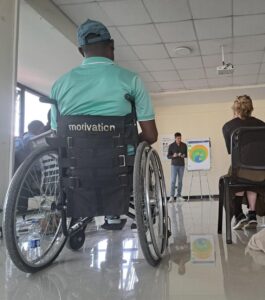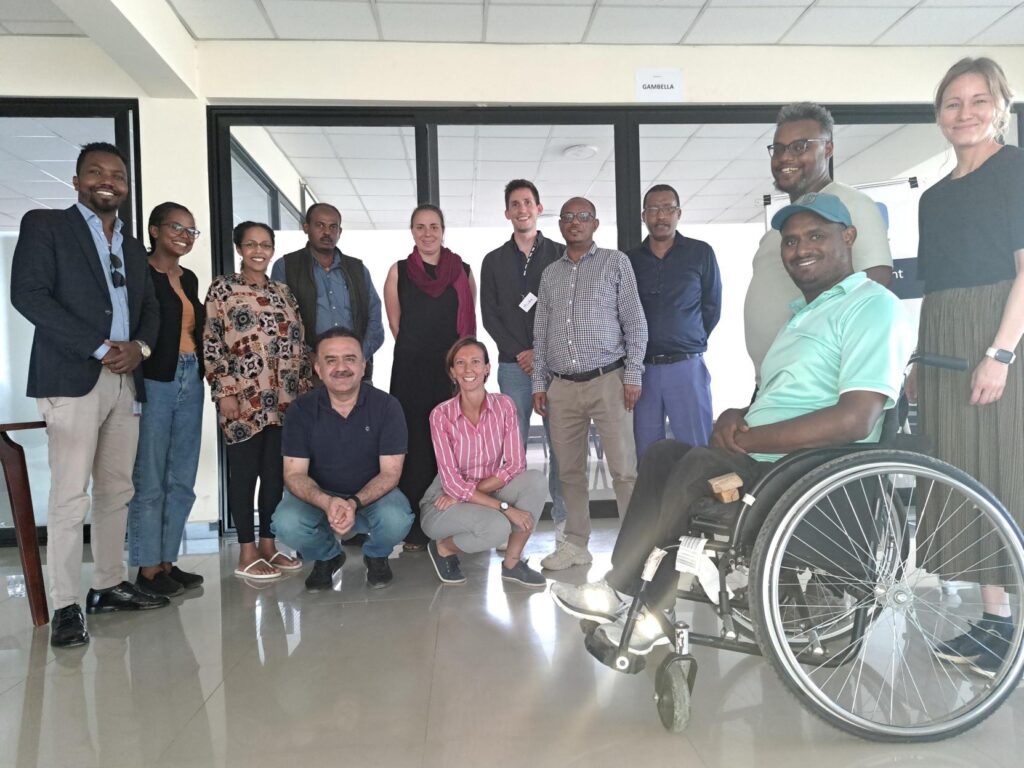Inclusivity is not just a principle but a necessity. Our training programmes are designed with every NGO partner in mind, making them accessible to all, including participants with disabilities. Yet, for many NGO workers with disabilities, barriers to participation persist. Societal stigma, inaccessible infrastructure, and financial constraints often exclude capable individuals from critical personal and development opportunities. Recognising these challenges, INSO tries to actively identify and address the obstacles that hinder true inclusivity.
Yohannes’ Story
Yohannes Arkebe, Founder and Executive Director of New Horizon for Disability and Development, exemplifies both the challenges and opportunities for change. Based in the Tigray region of Ethiopia, Yohannes has dedicated his life to empowering persons with disabilities. A wheelchair user since childhood, he understands deeply the societal and logistical hurdles that people with disabilities face daily: “I’ve struggled with society’s lack of awareness and the lack of physical accessibility … everyone in the world should know that inclusion is a must and a right…the issue of disability is often forgotten.”
“Over 20% of the world has disabilities, and they deserve attention”
New Horizon is a national NGO whose mission is to ensure that persons with disabilities feel empowered to exercise their rights and participate equally in socioeconomic development, to reduce inequality in Ethiopia. New Horizon provides support services, training programs, and awareness campaigns all with the goal of ensuring that both children and adults with disabilities receive the tools and knowledge needed to foster their growth and success.
When our roving team visited Ethiopia to conduct a series of trainings, including one on crisis management, Yohannes received an invitation through the protection cluster mailing list. “We knew that this training was a golden opportunity,” says Yohannes.
Hidden Costs: Financial Barriers to Training Participation
However, Yohannes faced additional barriers in attending the training. “Our NGO is based in Mekelle, and the training was in Addis Ababa. The only way to get there in my wheelchair is by plane, and that would be too expensive. We have no money to spend on transport and accommodation,” he explained.
This situation will be familiar to several NGOs, who may lack the budget or flexibility to cover training expenses. For disabled individuals, these financial barriers are even greater due to hidden costs. These can include the need for a caregiver, specialised transportation, or accessible accommodation—all of which increase overall expenses.
For example, “In Ethiopia, in public transport, there is rarely a space or a ramp for a wheelchair. If you do take public transport, you pay extra for having a wheelchair and for your assistant. It gets very expensive,” explains Yohannes, adding, “many organisations forget about these disability related costs.”
Recognising the importance of including voices like Yohannes’, INSO provided financial support to cover his transport costs. “INSO offered to pay for my travel from Mekelle to Addis Ababa. Without that support, I couldn’t have attended,” said Yohannes.

Yohannes during the Crisis Management Training in Addis Ababa
Félicie Chevallier Director of Training at INSO says “Yohannes’ experience highlights the systemic challenges faced by disabled NGO workers and the importance of deliberate, community-wide action. By addressing these barriers, we make humanitarian spaces more equitable and better equipped to serve those who rely on them. Together, we can build a sector where everyone—regardless of ability—has the opportunity to contribute and thrive.”
While INSO provides free training, covering additional costs for individuals and national NGOs on a case-by-case basis ensures that financial constraints do not exclude those most in need. “This type of training is invaluable,” shared Yohannes. “I met a lot of people from international organisations and shared our experiences […] in only one day we got a good understanding of crisis management. We need this training on a country level and in other regions, especially for local NGOs.”
INSO’s Roving Training Team is gratefully supported by CDCS. In 2024 we have been able to train over 4,400 NGO workers. You can find out more about the trainings we do via: https://ngosafety.org/what-we-do/

